Long tail keywords are Gold in the SEO world. No, I am not exaggerating the fact. This is an absolute truth.
Ace Internet marketer Neil Patel has increased his search engine organic traffic to 173,336 visitors per month after incorporating long tail keywords in his content.
What is more,
New York-based SEO & SaaS company Conductor found that long-tail keywords are 2.5 times more effective than head terms in converting visitors into customers.
Tim Soulo, head of marketing at Ahrefs, analyzed 1.4 billion keywords. He found that 40% of all searches were coming from such type of keywords that have less than 50 searches per month.
Aren’t these stats sufficient to establish the importance of this type of keywords?
Don’t you re-plan your SEO strategy keeping long tail keywords in the mind? Of course, you should.
Now the question comes,
What are Long Tail Keywords?
Long tail keywords are usually 3 or 4 keyword phrases that have relatively low search traffic, but they are highly precise to what you are selling; therefore, they offer higher conversion rate.
Most long tail keywords are at least 3 words long. However, the length itself does not decide whether a keyword qualifies to be a long tail.
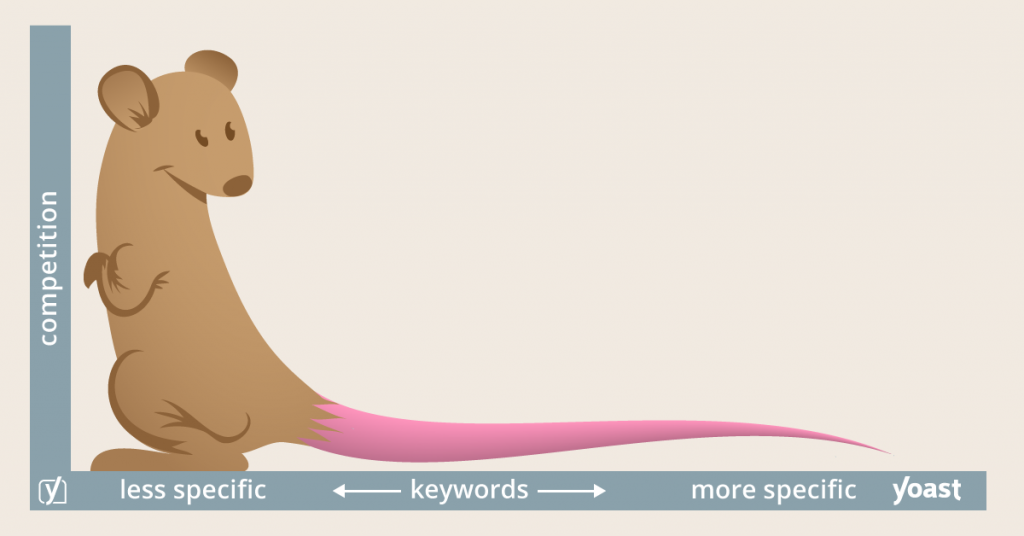
This graphic from Yoast explains long tail keywords aptly.
It is clear from the graphic that long tail keywords are easier to rank than head keywords.
An illustration from Moz will explain it further.

Suppose you offer virtual assistants for busy entrepreneurs. ‘Virtual assistant services’ is a head keyword that has 1k-10k avg. monthly searches.
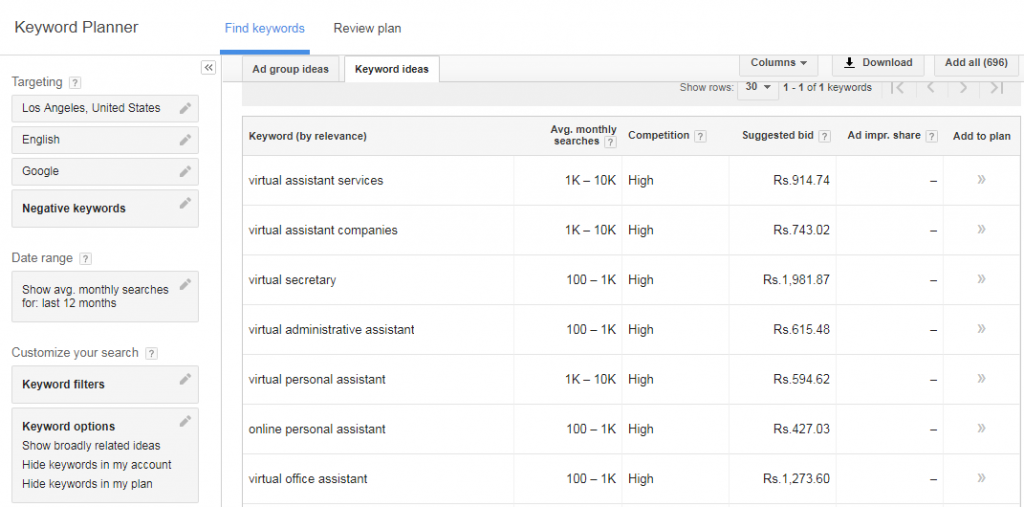
However, ‘virtual assistant cost’ is a long tail keyword that has 100-1k avg monthly searches.
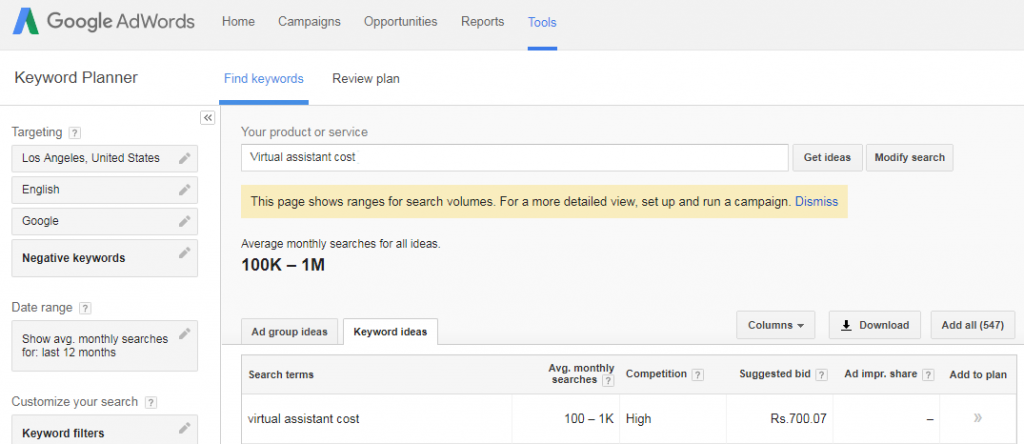
Needless to say, it will be easy for you to rank for ‘virtual assistant cost’.
What’s more, ‘virtual assistant cost’ keyword, being highly specific, will bring in more visitors who are interested in hiring virtual assistants.
Why You Should Use Long Tail Keywords
You must be thinking that why you should use long tail keywords.
Well, my friend, they bring in money.
If you focus on long-tail keywords instead of head keywords, you are more likely to get visitors who are ready to buy your products or services.
Here are the top three reasons why you should use long tail keywords:
- It is quite easy to rank for long tail keywords as compared to head keywords
- They send targeted traffic to your website. This means you will be able to register more sales quickly
- If you want to run paid advertising, it will be cheaper for you to use Google AdWords for long tail keywords as competitive keywords tend to have a high cost per click
Need any more reason to include long tail keywords in your SEO strategy?
How to Find Long Tail Keywords
So you are convinced that you will include long tail keywords in your content.
Great! It is a wonderful decision.
How will you find long tail keywords for your business?
I have explained below five ways to find long tail keywords in your niche:
1- Google Keyword Planner
Despite the arrival of many advanced keyword research tools, Google Keyword Planner is still the one without which my keyword research does not complete.
This powerful, free tool from Google is easy-to-use.
Follow these steps to find keywords with the help of Google Keyword Planner.
Step-1:
Suppose, you offer soft toys, and you want to search for long-tail keywords for the seed keyword ‘soft toys’.
Type ‘soft toys’ in Keyword Planner and click on ‘get ideas’
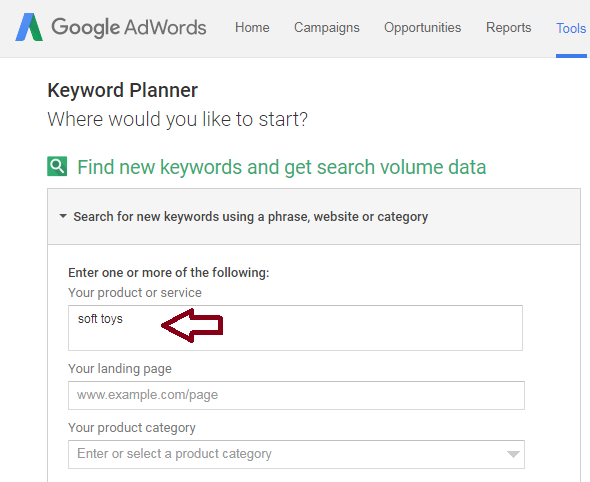
Step-2
After clicking on ‘get ideas’, you will see the list of the following keywords ideas.
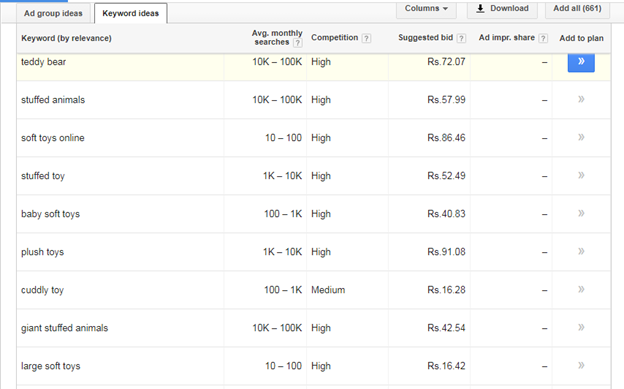
Step-3
Now you need to pick the relevant keywords from these keyword ideas.
It is advisable that you should pick keywords that are high in demand because you will use variations of these keywords.
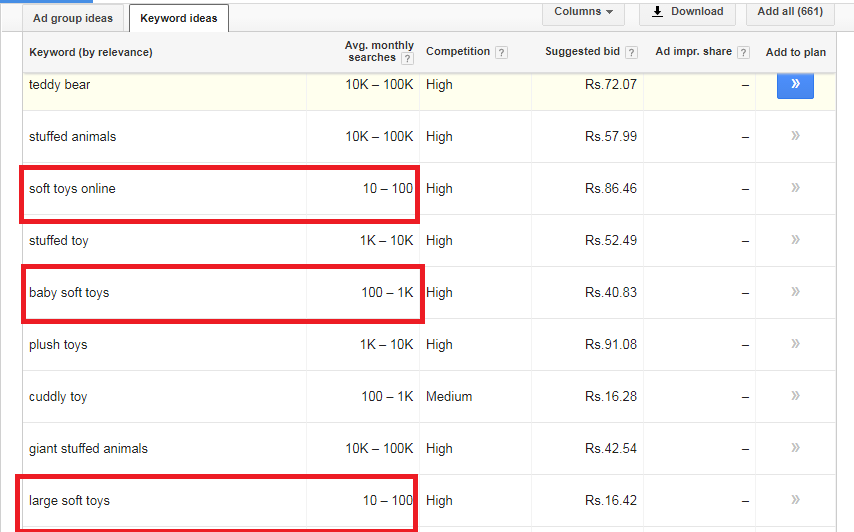
Step-4
Now search these selected keywords again for long tail keyword ideas.
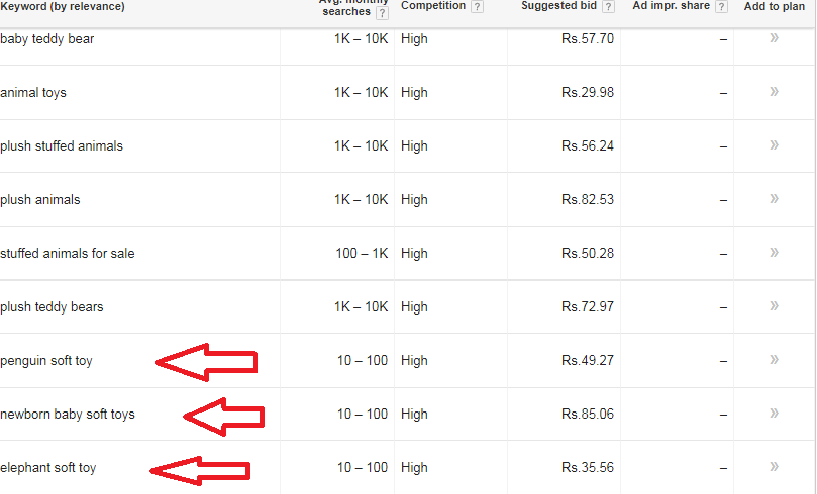
Merely searching long tail keywords is not enough. You need to understand the intent behind it.
Long tail keywords can have both the intents – informational and commercial.
Long tail keywords that address the need of searchers are more likely to perform.
2- Searched Related To
Have you ever looked at the bottom of SERP? Let us search for the head keyword ‘soft toy’ and look at the bottom.
Let us search for the head keyword ‘soft toy’ and look at the bottom.
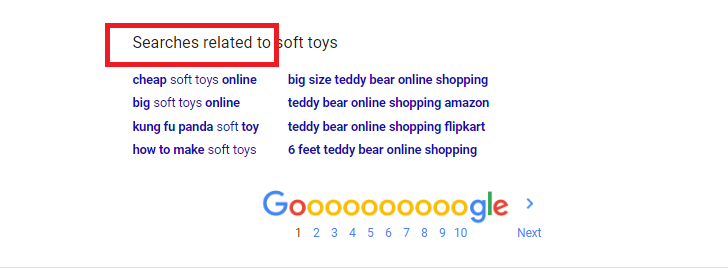
My friend, this little area is a great place to search for long tail keywords.
If you study these related terms closely, you can easily get keyword ideas. I believe ‘cheap soft toys online’ and ‘big soft toys online’ would be good long tail keywords for your business.
If you again google for cheap soft toys online’, you will get the following results:
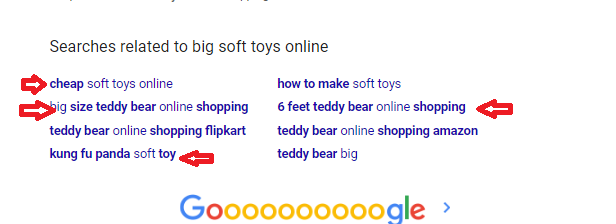
You have found four more keywords that are long tail keywords.
You should rinse and repeat this process until you get a list of highly specific long-tail keywords.
As I have mentioned earlier, you need to understand the intent behind long tail keywords. If it matches with your buyer’s intent, you have found a goldmine.
If you want to use Google’s related search keywords, then “People Also Search For” is the best feature of Google. It will give you the most accurate keywords. Read the complete ultimate guide on People Also Search For.
3- Google Trends
Google Trends is also a popular tool to find long-tail keywords. Also, it helps you understand the futuristic trend of your head keyword.
If your search the trend for ‘soft toys’, you will get the following result.
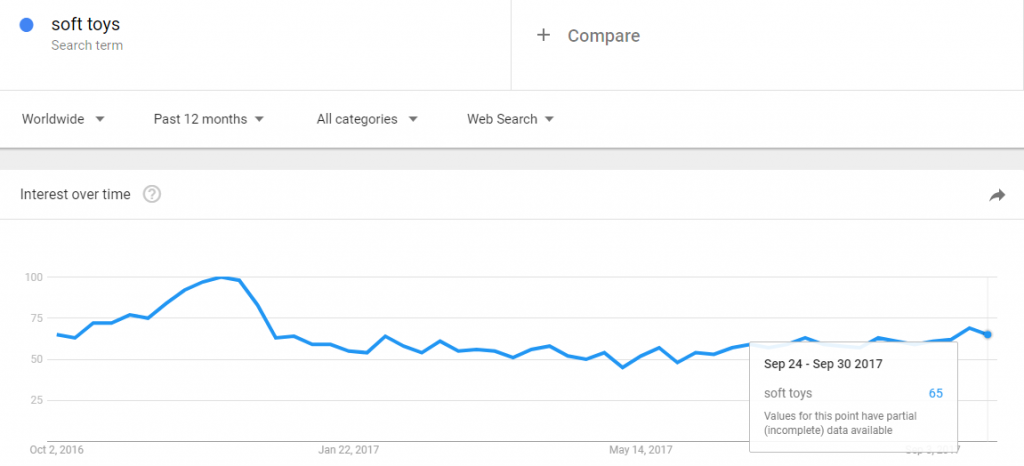
As you can see in the graph, the trend for ‘soft toys’ is stable. This means it is safe to focus your SEO efforts around this keyword.
Now scroll down the page. You will see the related topics and the related queries.

Look into related queries section – here you can get plenty of long tail keywords.

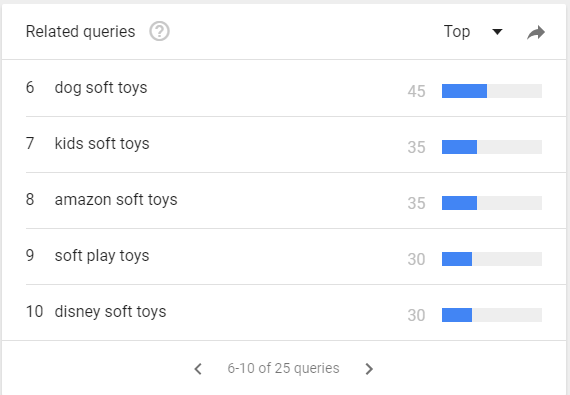
Google Trends, many times, suggest lucrative long tail keywords that escape Google Keyword Planner.
4- Keyword Research Tools
In my detailed post – 52 On-page SEO Tools Smart Digital Marketer Shouldn’t Ignore, I have discussed keyword research tools at length.
You should refer to this post if you want to get detailed information about keyword research tools.
Here in this article, I am going to talk about my favorite keyword research tool – KWFinder.

If you search for a keyword – soft toys, the following window will open.
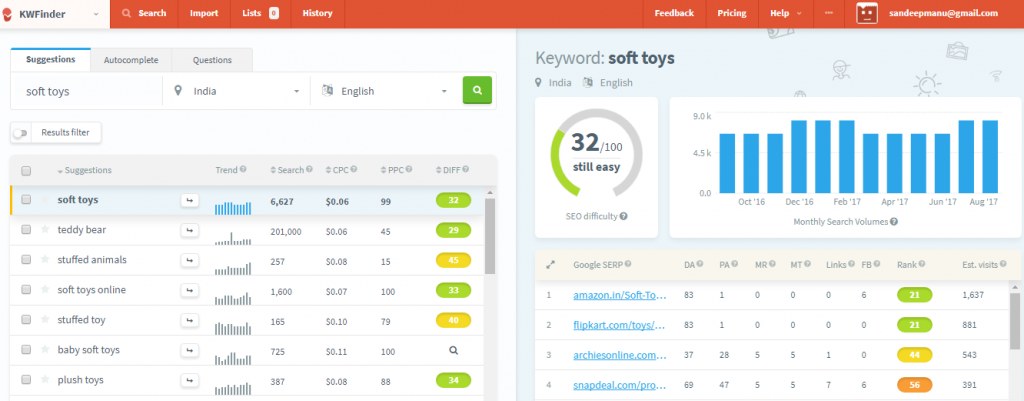
What I really like about KWFinder is its detailed analysis. Not only do you get keyword suggestions, you can also view autocomplete suggestions.
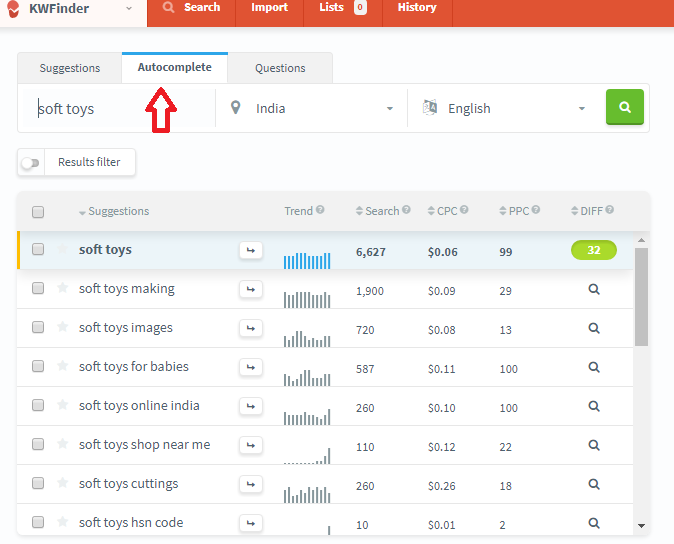
It gives you an idea about the SEO difficulty of a keyword as well.
5- Quora
Quora is a highly popular Q&A community website. It has around 80M visitors.
Now you must be thinking that how this Q&A community can help you find long tail keywords for your business.
It can. This is what I am going to discuss it here.
First of all, you need to create your account on Quora, which is quite simple. Either you can continue with Facebook or Google account or you can create a new account.
Once you have created your account, login and search for the head keyword in the topic section.
Quora will show you the topic with questions and followers.

Now click on the questions, Quora will show you the popular questions in your niche.

Study these questions carefully, and you can get ideas for long tail keywords.
If you pick the phrase ‘wearing high heels hurt’ and search it in Google Keyword Planner, you will get the following results.
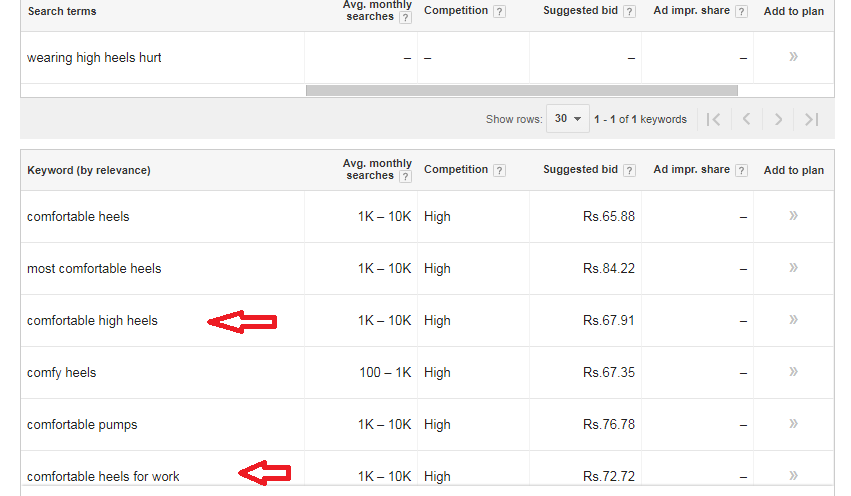
‘Comfortable heels for work’ and ‘comfortable high heels’ are long tail keywords for your head keyword.
This is how Quora can help you find keywords that you cannot think of otherwise.
Conclusion:
Long tail keywords, if used strategically, can help you generate lots of sales. Google keyword planner, search related to, Google Trends, Keywords research tools are a few good ways to finding long tail keywords in your niche.
What about you?
Are you using long tail keywords in your SEO strategy? How is the result? Do share it in the comment section. I would love to know about it.
Additional Resources:
- The Ultimate Guide to Understanding People Also Search For In Google Search
- SEO Keyword Research: 9 of the Biggest Mistakes You MUST Avoid


In fact, I think you cannot rely on anyone Keyword Research tool as such because, in the long run, the search behavior keeps on changing and also fluctuates from country to country. Keeping all options open for a global traffic and targeting for the maximum possible targeted keyword phrases should be the aim for the keyword research phase.
Instead of focusing on only the keywords recommended by keyword research tools and Adwords also concentrate on the possible psychologies of users from various geographic areas unless you are concentrating only on a very particular area where only the language and slang of that place concerns for the search of that site. Online users from different places, of different age groups and the various educational backgrounds, think differently and use different language and jargon.
Instead of focusing on only specific fixed key terms we should work to keep the possibilities of a wider circle of permutations and combinations of key phrases open for the site. The analytics data, in fact, can give a proper meaning of what searches are actually taking place countrywide.
Anyways, very informative article. Delivers some great points to light…
Thanks for your valuable comment Barakha. For sure, there are many possible ways to find keywords.
Unless you use the correct keyword Google’s spiders are never going to crawl your content and your site is least likely to get the visibility it requires.
A valid point, indeed!
Thank for nice words!